October 17
John Wilkes
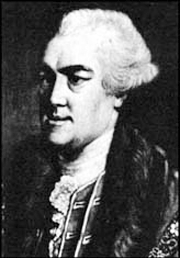
On this date in 1727, John Wilkes, future lord mayor of London, was born in England. He studied at Leyden University. Wilkes was known for his witticisms, once announcing before a card game, “I am so ignorant that I cannot tell the difference between a king and a knave.” Wilkes became high sheriff of Buckinghamshire in 1754 and was elected a member of Parliament for Aylesbury in 1757, where he agitated for reform.
He founded the periodical North Briton in 1762 to campaign against the king and his prime minister. Wilkes was prosecuted for seditious libel for an article appearing in April 1763 and was sent to the Tower but was released under parliamentary privilege.
His “Essay on Woman” (1763), which was both bawdy and blasphemous, was burned by the hangman. Parliament voted to repeal the privilege of arrest for seditious writings and Wilkes escaped arrest by fleeing to France, where he was welcomed by Baron d’Holbach and Diderot. After Wilkes returned to England, he was arrested. A crowd of 15,000 assembled at the prison where he was held, chanting “Damn the King.” Troops opened fire and killed seven in the Massacre of St. George’s Fields.
Wilkes, sentenced to 22 months, was expelled from the House of Commons but voters reelected him. After a long fight he was seated. A deist, he made a campaign for religious toleration a priority. Wilkes supported America in the War of Independence. He became lord mayor of London in 1774. His popularity waned toward the end of his life as he became more conservative. He died at age 72 in London of a disease known at the time as marasmus. (D. 1797)
Georg Buchner
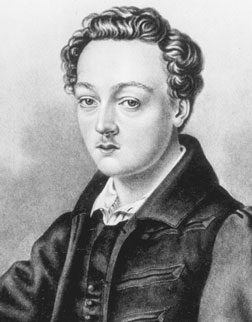
On this date in 1813, playwright and poet Karl Georg Buchner was born in Goddelau, Germany. The eldest child, his siblings included freethinkers Alexander and Ludwig (and Louise, Mathilde and Wilhelm). He studied medicine in Strasbourg and Gissen. An intense student of Spinoza’s writings, Buchner earned a doctorate in philosophy and lectured in natural history in Zurich, Switzerland. Having developed a passion for radical politics, for a short time he edited Der Hessische Landbote, a pamphlet with the well-known Revolutionary-era slogan “Peace to the Huts and War to the Palaces.”
Despite living only until age 23, Buchner gained a reputation as a powerful playwright and, though he only wrote one, novella author. He wrote the play “Leonce and Lena” (1838) and part of a play called “Woyzeck” (published posthumously in 1879). Some of his other plays have been lost, but “Danton’s Death” (1835), was a well-received work that depicted an atheistic Thomas Paine (whom he called “Payne”). “Danton’s Death” was written about two years before his own death and, by the author’s claim, was completed in less than five weeks.
While a political refugee in Zurich, he died of typhoid fever at age 23. In 1923 Buchner’s hometown of Darmstadt, Germany, created the Georg Buchner Prize for literature, which is still a prestigious award. (D. 1837)
Mercier: But what about morality?
Payne: First you adduce morality as a proof of God, and then cite God in support of morality. You reason in a beautiful circle, like a dog biting his own tail.— Buchner's "Payne" in "Danton's Death"
William Anders
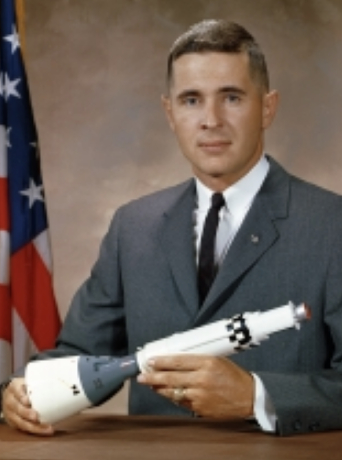
On this date in 1933, astronaut William Alison Anders was born in Hong Kong to Muriel (Adams) and Arthur Anders. He became one of the first three people to travel to the moon when he served as the lunar module pilot for Apollo 8 with Frank Borman and James Lovell in 1968. They were the first persons to leave Earth’s orbit and see all of Earth from space.
One of Anders’ roles during the flight was to take photographs of the back of the moon, something no person had ever seen before. The most famous picture he took, of Earth rising behind the moon, called “Earthrise,” was made into a U.S. postage stamp. Anders, who was raised Catholic, reconsidered his religious beliefs of a god creating humans in his own image when he saw how insignificant Earth is from space.
He became an astronaut for NASA in 1964 after earning his undergraduate degree from the U.S. Naval Academy in 1955. (His father was a naval officer aboard the USS Panay in a famous incident with Japan in 1937.) After graduation he chose to be commissioned a second lieutenant in the U.S. Air Force. He earned his master’s in nuclear engineering from the Air Force Institute of Technology in 1962 and completed the Harvard Business School Advanced Management Program in 1979.
Anders worked for the federal government for 26 years, which included time spent as executive secretary for the National Aeronautics and Space Council. He then became a member of the Atomic Energy Commission and later worked as the general manager of GE’s Aircraft Equipment Division. Anders also served as American ambassador to Norway and CEO of General Dynamics Corp.
Anders, who retired as a major general, married Valerie Hoard in 1955 and they had six children. His charity, the Anders Foundation, founded the Heritage Flight Museum in 1996 in Burlington, Wash.
He died at age 90 when a small plane he was piloting alone dived into the water near Roche Harbor, Wash., northwest of Seattle. (D. 2024)
“It really undercut my religious beliefs. The idea that things rotate around the pope and up there is a big supercomputer wondering whether Billy was a good boy yesterday? It doesn’t make any sense. I became a big buddy of Richard Dawkins.”
— Anders, "Earthrise: how the iconic image changed the world," The Guardian (Dec. 24, 2018)
Arthur Miller
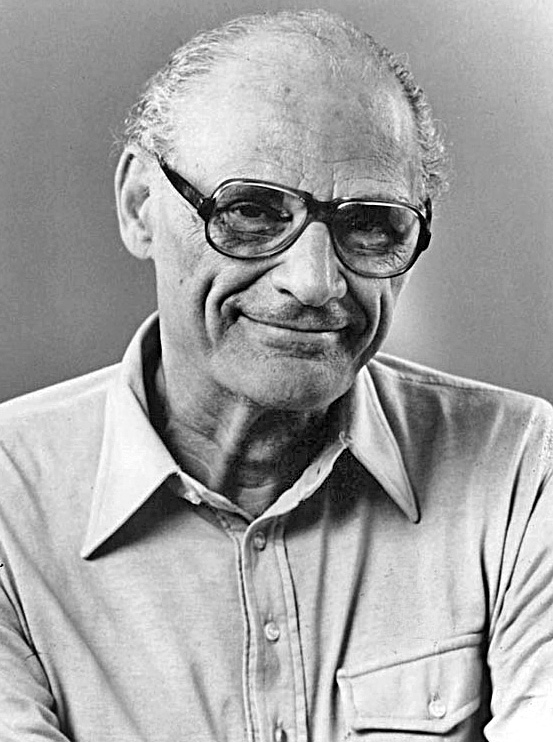
On this date in 1915, essayist and playwright Arthur Asher Miller was born into a Polish-Jewish family in Harlem, New York. As a child growing up in New York City, Miller delivered bread in the mornings before school to help his family, which had lost nearly everything in the financial crash of 1929. His career as a playwright began at the University of Michigan, where he won the Avery Hopwood Award for the play “No Villain” (1936), which he wrote as a sophomore. He won a second Hopwood for the play “Honors at Dawn” (1936).
Miller earned his first Tony Award (for best author) and Broadway hit with “All My Sons” (1947). A year later, after building his own studio in Roxbury, Conn., he completed “Death of a Salesman” (1949). It was an instant commercial and critical hit, and Miller was awarded his second Tony, a New York Drama Circle Critics’ Award and the Pulitzer Prize for Drama. A prolific playwright and screen writer, he wrote his first play in 1936 and his last in 2004.
His 1953 play “The Crucible” compared the national hysteria surrounding Communist Party membership to the Salem witch trials, which led to him being called to testify before the House Un-American Activities Committee. Miller refused to “name names” and was convicted of contempt of Congress, which was overturned on appeal.
Miller was married to Mary Slattery from 1940 to 1956, when he married the film star Marilyn Monroe. They divorced in 1961, 19 months before she died. He had written the screenplay for “The Misfits,” the last movie she completed. He married photographer Inge Morath in 1962. Miller had four children, including a son born in 1966 with Down syndrome. He had Daniel institutionalized against his mother’s wishes and refused to visit him.
The couple kept their son’s birth a secret, finally revealed in 2007 by Vanity Fair. As of this writing in 2019, Daniel was doing well and living with a foster family in Connecticut. The 2018 play “The Fall” by Bernard Weintraub explored the situation.
Miller was an outspoken atheist for much of his life. In 2004, a year before his death at age 89, he participated in a BBC documentary titled “The Atheism Tapes.” Miller talked with Sir Jonathan Miller, an English neurologist and theater director, about his atheism and Jewish background. (D. 2005)
“The wedding of Christianity or Judaism with nationalism is lethal in my opinion.”
— Miller, “The Atheism Tapes” (2004)
Michael McKean
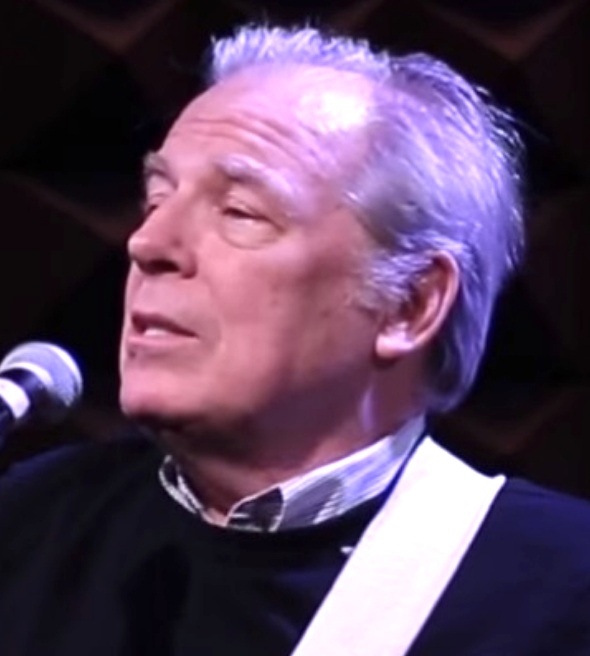
On this date in 1947, entertainer Michael John McKean was born in New York City to Ruth and Gilbert McKean. His mother worked in a school library and his father was a recording executive for RCA and Columbia before co-founding Decca Records.
McKean grew up in Sea Cliff on Long Island. After high school graduation he was briefly a member of The Left Banke, a band which earlier had hits with “Walk Away Renée” and “Pretty Ballerina.” McKean’s acting breakthrough came in 1976 when he and David Lander, who met as Carnegie Mellon University theater students, joined the cast of the ABC sitcom “Laverne & Shirley,” respectively playing Lenny and Squiggy.
After leaving the show in 1982, McKean played David St. Hubbins in the 1984 mockumentary film “This Is Spinal Tap” and appeared in the soap opera spoof “Young Doctors in Love.” He had more film roles, including in “Planes, Trains and Automobiles (1987), “Short Circuit 2” (1988) and with Kiefer Sutherland and Dennis Hopper in the adventure comedy “Flashback” in 1990.
McKean joined the “Saturday Night Live” cast from 1994-95 after guest hosting. At 46, he was the oldest person ever to join the cast at the time. McKean reunited in 2000 with Spinal Tap’s Christopher Guest in “Best in Show” and “A Mighty Wind” (2003), for which he co-wrote several songs, including “A Mighty Wind,” which won a Best Song Grammy, and the Oscar-nominated “A Kiss at the End of the Rainbow.”
He continued to land numerous film and TV roles and performed on Broadway in 2012 in a new production of the 1960 play “The Best Man” by Gore Vidal. He was nominated for a 2019 Primetime Emmy for his portrayal of Chuck McGill, brother of Saul Goodman, on the AMC drama “Better Call Saul.” His most recent film role as of this writing was in “Pink Skies Ahead,” scheduled for a 2020 release.
McKean married Susan Russell in 1970. They had two sons, Fletcher and Colin, before divorcing in 1993. Colin, a movie production assistant, died at age 36 of a suspected heroin overdose in 2012. McKean married actress and singer-songwriter Annette O’Toole in 1999.
He criticized U.S. Secretary of State Mike Pompeo in 2020 after a 2015 video surfaced in which Pompeo expressed his opposition to same-sex marriage while addressing a church congregation. In the video, Pompeo says, “We will continue to fight these battles. It is a never-ending struggle, until the Rapture.” McKean tweeted, “You wouldn’t accept an air-traffic controller who was a flat-earther, so why accept a US Secretary of State who thinks the Rapture is imminent?” (Jan. 10, 2020)
PHOTO: McKean singing “Kiss at the End of the Rainbow” with Annette O’Toole at Joe’s Pub at the Public Theater in New York City in 2016; “Employee of the Month” photo under CC 3.0.
“Belief in the Rapture should disqualify anyone from holding public office.”
— McKean post on Twitter (April 8, 2020)
